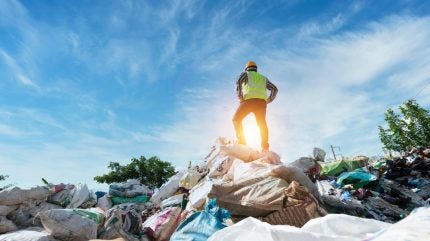
Plastic waste continues to accumulate at an alarming rate, with traditional recycling methods struggling to keep pace. Chemical recycling, also known as advanced recycling, offers a promising avenue to address this challenge by converting plastic waste into high-quality materials suitable for reuse.
Yet, despite its potential, many plastics manufacturers remain hesitant to invest.

Discover B2B Marketing That Performs
Combine business intelligence and editorial excellence to reach engaged professionals across 36 leading media platforms.
As regulatory pressures intensify and consumer demand for sustainable practices grows, delaying investment in chemical recycling could leave companies at a significant disadvantage, both technologically and economically.
What Is chemical recycling and how does It differ from mechanical recycling?
Chemical recycling involves breaking down plastic waste into its fundamental molecular components using processes such as pyrolysis, gasification, or depolymerization.
These processes yield outputs like monomers or synthetic oils, which can be reprocessed into new plastics with properties comparable to virgin materials.
In contrast, mechanical recycling entails physically processing plastics—shredding, washing, and melting them into pellets. This method is limited by contamination issues, degradation of plastic quality over time, and restrictions on the types of plastics that can be effectively recycled.

US Tariffs are shifting - will you react or anticipate?
Don’t let policy changes catch you off guard. Stay proactive with real-time data and expert analysis.
By GlobalDataChemical recycling can handle a broader range of plastic waste, including mixed and heavily soiled plastics that are unsuitable for mechanical recycling. This includes multi-layer packaging, colored plastics, and materials contaminated with food or adhesives.
By converting such waste into high-grade feedstock, chemical recycling supports sustainability goals and reduces reliance on fossil fuels.
Market demand and regulatory pressure are growing
The impetus to innovate in recycling technologies is driven by multiple factors. Governments worldwide are implementing stricter regulations to promote recycling and reduce plastic waste.
In the UK and EU, new policies are being introduced to encourage circular practices, including mandatory recycled content requirements for packaging and taxes on virgin plastic use.
Consumer preferences are also shifting. Eco-conscious buyers increasingly favor brands that demonstrate a commitment to sustainability. For plastics firms, integrating chemical recycling into their operations is becoming not just a competitive advantage but a business necessity.
Investors are taking note as well. Environmental, Social, and Governance (ESG) performance is now a critical consideration in investment decisions. Plastics manufacturers that fail to align with circular economy principles may find it challenging to attract capital.
For companies seeking long-term resilience, the ability to process mixed plastic waste through chemical recycling is increasingly viewed as a strategic asset.
Scaling chemical recycling: challenges and opportunities
Despite its advantages, widespread adoption of chemical recycling faces several obstacles. The technology is still evolving, and establishing facilities at an industrial scale requires significant capital investment.
Processes like pyrolysis and gasification are scrutinized for their energy consumption and emissions, though ongoing innovations aim to enhance efficiency and environmental performance.
Regulatory frameworks also present challenges. In some jurisdictions, outputs from chemical recycling are not yet recognized as recycled content, complicating compliance and reporting. However, policy shifts are underway.
The European Commission and UK authorities are reviewing regulations to better accommodate and encourage chemical recycling methods. Clear guidelines could facilitate broader industry adoption and accelerate infrastructure development.
Collaborations across the value chain are helping to address scale and cost concerns. Partnerships between waste management firms, technology providers, and major plastics producers are becoming more common.
These alliances enable shared investment, reduce risk, and facilitate the integration of chemical recycling into existing systems. As more facilities come online and technology matures, costs are expected to decrease, enhancing commercial viability over time.
Now is the time to act for long-term advantage
The window of opportunity for plastics firms to establish themselves as leaders in sustainable innovation is open but narrowing. Early adopters of chemical recycling are already gaining market share, building brand credibility, and securing valuable partnerships.
Delaying action risks missing out on these first-mover advantages.
By committing to chemical recycling now, companies can future-proof their operations against tightening regulations and rising demand for recycled content. They can also contribute meaningfully to environmental goals, such as reducing plastic pollution and lowering greenhouse gas emissions.
For plastics firms, the message is clear: invest in chemical recycling or risk obsolescence in a world rapidly moving toward sustainability. The cost of inaction may soon outweigh the cost of change.
Those who seize the moment will not only help lead the transition to a circular plastics economy but also ensure their relevance and resilience in the decades ahead.





